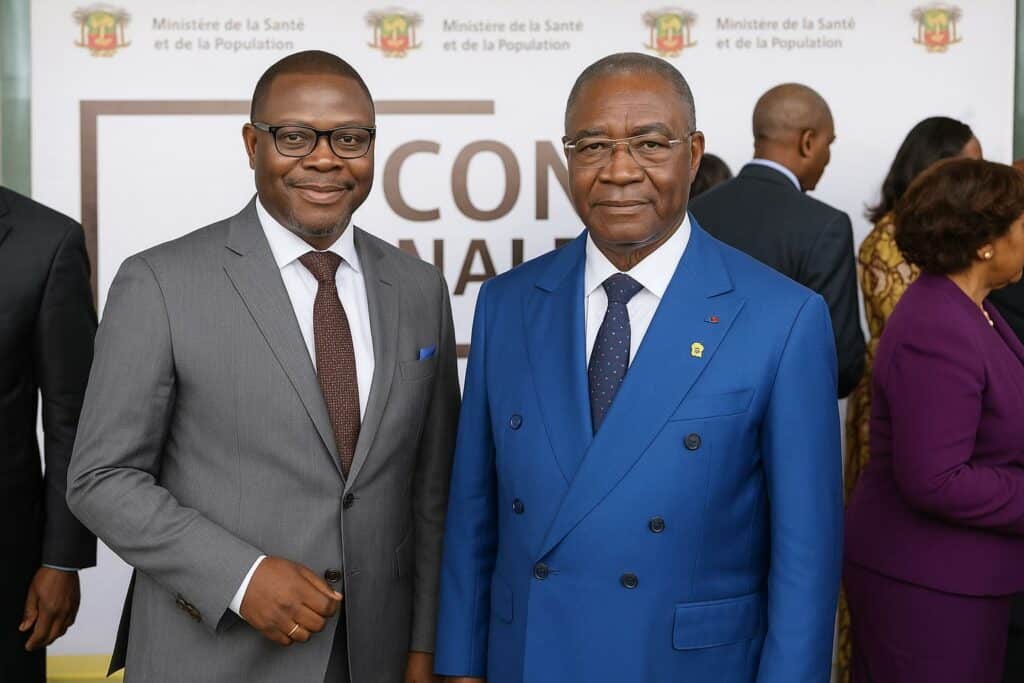Historic Context of the Health Council
Created in 1984 during President Denis Sassou Nguesso’s first administration, the National Health Council spent four decades in relative dormancy before its revival in 2021. The second ordinary session, held in July 2025 at Kintélé, thus carried both symbolic and operational weight. Prime Minister Anatole Collinet Makosso framed the gathering as a decisive moment for social cohesion, arguing that no economic dividend can be harvested without a healthy population. His statement echoed the Presidency’s broader development vision, encapsulated in the current National Development Plan, which earmarks public health as a strategic growth sector (Government of Congo 2024).
The presence of 15 cabinet members, departmental prefects and international partners testified to the political priority now accorded to health. Dr Vincent Dossou Sodjinou, the WHO Representative in Brazzaville, praised the renewed momentum, noting that resilient governance is the bedrock of epidemic preparedness, a lesson underscored by the COVID-19 and Mpox outbreaks across Central Africa (WHO 2024).
Governance and Financing Debates
Behind the ceremonial rhetoric, delegates immersed themselves in legal detail. Jurists and parliamentarians acknowledged that the 1984 decree establishing the Council predates decentralisation reforms and contemporary public–private financing instruments. A redrafted decree, now under inter-ministerial consultation, is expected to clarify lines of authority between the central ministry, departmental councils and facility management boards, thereby reducing duplication and leakages.
Financing occupied equal bandwidth. According to Ministry of Finance data, public health expenditure reached 5.1 percent of GDP in 2024, above the West-Central African average yet below the Abuja target of 15 percent. Experts therefore proposed a three-tier strategy: broadening the fiscal space through earmarked ‘sin taxes’, leveraging concessional borrowing from the African Development Bank, and attracting outcome-based grants from the Global Fund. The World Bank’s 2023 appraisal of Congo’s Human Capital Index highlighted that every US dollar invested in primary care yields a four-fold return in labour productivity, an argument that resonated with the economic portfolio holders present (World Bank 2023).
Tackling Rural–Urban Health Disparities
While Brazzaville and Pointe-Noire have recently inaugurated tertiary hospitals, epidemiological surveys reveal that maternal mortality in Sangha and Cuvette Ouest departments remains nearly double the urban figure. Delegates thus scrutinised mechanisms for redistributing human resources. The Ministry of the Civil Service announced plans to pilot a territorial health corps, granting career incentives to practitioners who accept rural postings for at least five years. International evidence from Rwanda and Thailand, cited by UNICEF experts in attendance, suggests such bonding schemes can sustainably reverse clinician flight.
Parallel to human resources, infrastructure modernisation was debated. The imminent openings of Ouesso and Sibiti general hospitals were welcomed, yet engineers warned that reliable electricity and cold-chain logistics must be secured to protect biomedical equipment from tropical humidity. The Energy Ministry reported progress on a solar-diesel hybrid grid for remote facilities, financed via the Congo Sustainable Energy Fund launched last year (AFD 2024).
International Partnerships and SDG Alignment
Congo-Brazzaville has aligned its National Health Development Plan with Sustainable Development Goal 3, committing to a one-third reduction in premature mortality by 2030. The Council’s deliberations therefore attracted keen interest from multilateral agencies. UNICEF pledged technical support for community-based data systems, while the UNFPA representative advocated integrating reproductive health indicators into the Council’s dashboard to ensure women’s health remains visible amid competing priorities.
China’s Exim Bank confirmed that phase II of its concessional loan package will cover telemedicine links between Brazzaville University Hospital and district hospitals, a project anticipated to mitigate specialist shortages. Meanwhile, the EU delegation highlighted the potential of regional procurement pools to lower vaccine prices, citing the success of the African Vaccine Acquisition Trust. Such external commitments, however, hinge on the Council’s capacity to track results, an accountability dimension repeatedly emphasised by civil-society observers.
Next Steps Toward Universal Coverage
After three days of negotiation, the Council adopted nine clusters of recommendations ranging from decree reform to community participation. Health Minister Jean-Rosaire Ibara concluded that equity is now an ethical imperative rather than an aspirational slogan. The approved roadmap sets 2026 as the deadline for installing functional governance committees in every department, 2027 for rolling out digital patient registries, and 2029 for achieving at least 80 percent financial risk protection across the population.
Implementation will undoubtedly encounter fiscal and administrative friction. Yet the political consensus forged in Kintélé suggests a new maturity in Congolese health diplomacy, one that situates the right to health at the centre of nation-building. For international partners, the session offered reassurance that domestic stewardship is strengthening. For Congolese citizens, it rekindled the expectation that geographical location or household income will no longer dictate access to lifesaving services. In that sense, the Council’s revival may mark the moment Congo-Brazzaville converted lofty development pledges into a pragmatic, time-bound agenda.

